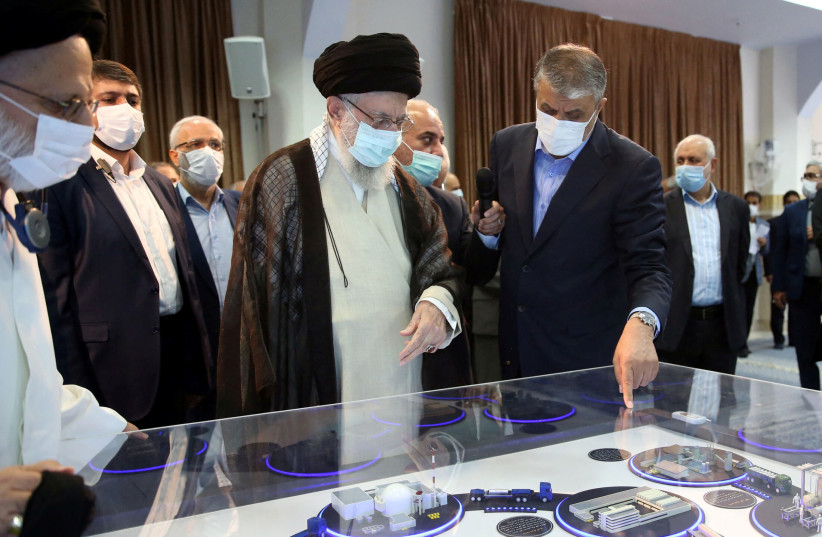Prime Minister Benjamin Netanyahu’s public and classified, but partially leaked, speeches at the Knesset on Monday may have signaled a major shift in doctrine about how to handle Iran’s nuclear program.
What is surprising about this shift is that it may be far more aggressive than in the past even though all of the prime minister’s most recent actions against Tehran seemed to signal utmost restraint.
To put it bluntly, on April 19 and October 26, he had two golden and unprecedented opportunities to attack and destroy the Islamic Republic’s nuclear program and he took a pass both times.
Interestingly enough, on Monday he publicly took credit for passing on attacking the nuclear program, though he could have easily blamed the decision on pressure from the US.
Obviously, pressure from the US not to strike Iran’s nuclear program was a key reason why Netanyahu limited Israel’s counter-strikes (after Iran had fired around 300 ballistic missiles, 170 drones, and dozens of cruise missiles at Israel over the course of its two attacks on Israel in April and October.)

But that is not the point.
Possible to strike Iran's nuclear program
The point is that he was comfortable both with taking responsibility himself for that call, while at the same time saying that he would seriously explore the possibility of striking the Islamic Republic’s nuclear program in the near future once President-elect Donald Trump takes office in two months.
Moreover, he said he would consider directly attacking Iran once Trump was in office, even though he contradicted Israeli military intelligence when he said that Iran is a long way away from figuring out how to deliver a nuclear weapon.
This last statement finally also explains why Netanyahu has been mostly silent as Tehran continues day after day and month after month to enrich more quantities of uranium to 60% levels and to cut off more of the International Atomic Energy Agency’s UN nuclear inspectors from checking up on the nuclear program.
Netanyahu simply does not feel threatened yet. He does not like Iran’s uranium progress or its more apparent concealing progress from the IAEA.
Yet, as long as the Islamic Republic cannot deliver a nuclear weapon anywhere near Israel and is not close to that capability, he does not need to sweat.
If all of the above is true, why does it seem like he has shifted to a potentially more aggressive strategy?
First of all, he said so: he specifically said he would talk through concrete aspects of a potential strike on Iran’s nuclear program with Trump.
But also it follows the trend of a changed Netanyahu in his approach to using force over the course of this war.
All indications were that from 1996-1999 and from 2009-2023, Netanyahu talked tough, but was extraordinarily careful about using force and dramatic and unpredictable military moves.
Until Hamas’s October 7 invasion, Netanyahu refused time after time to allow a deep invasion of Gaza or of Lebanon.
He wanted to avoid big wars at all costs.
But since then, he has seen Israel’s forces thoroughly militarily defeat all of Hamas’s 24 battalions as well as most of Hezbollah’s top weapons and leaders. Each of his military wins along the way in Gaza and Lebanon eventually led to riskier military moves in Gaza and Lebanon, which once again have mostly paid off.
Likewise, with Iran, his first counterstrike on April 19 was relatively tiny. His next counterstrike on Tehran on October 26 was already much larger.
After the first counterstrike, most of what Israel had done was kept relatively quiet. Following the second strike, everything was laid out in the open.
Those observing the October 6, 2023-Netanyahu would conclude that he is afraid of attacking Iran’s nuclear program and the fact he has not done it as prime minister in over 18 years and during two golden chances this year, shows nothing has changed.
Their supporting facts would be that Israel skipped an attack on the nuclear program despite the unprecedented legitimacy to hit Iran in April and October this year because Tehran itself openly, directly, and massively struck Israel.
Additionally at the threat of counter-strikes from Hamas and Hezbollah on Israel is the weakest in 18 years; and that the Israel Air Force actually ran circles around Iran’s air defense, instead of just estimating that it could.
But post-Gaza invasion and post-beeper Hezbollah attacks Netanyahu has shown that his initial hesitance over acting can transform into quite robust confidence the more he succeeds.
Paradoxically, what seemed like weak and small successful attacks on Iran, then may have made him much more likely to try a grandiose attack to remove the nuclear program in one fell swoop, precisely because, while small, the direct attacks on Iran – that he might never have actually tried absent this war – succeeded.
Add in that he feels released in terms of what he can do militarily and diplomatically with Trump coming into power in the US, and after 18 years in power, the stars may finally align for Netanyahu to give the order against Tehran’s nuclear program.
